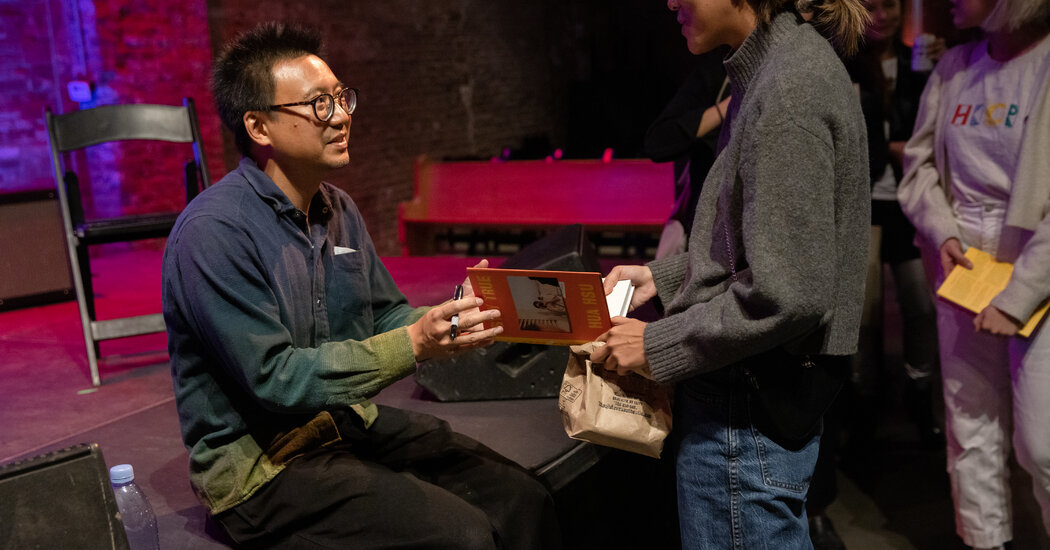
On Wednesday night, about 400 literary types packed into Pioneer Works, the sprawling art factory in the Red Hook section of Brooklyn, for the kind of social ritual that had been largely absent from the city’s calendar since the pandemic began: the blowout book party.
Hua Hsu, a staff writer for The New Yorker, was celebrating the release of his debut book, “Stay True,” a ’90s coming-of-age memoir chronicling his doomed friendship with a Japanese American frat boy named Ken. It is arguably one of this season’s most anticipated books, and New York’s literary scene turned out accordingly, along with characters from every chapter of Mr. Hsu’s life.
Cadres of chore-coat-clad editors from Pitchfork, GQ and The New Yorker sipped champagne from plastic cups near a concession stand selling copies of the book and happily accepted matchbooks from Mr. Hsu’s young son, part of a guerrilla marketing campaign that also included T-shirts, cassettes and zines.
Early arrivals included Jade Wong-Baxter, an agent and one of Mr. Hsu’s former students at Vassar College, where he was an associate professor until this year. Joseph Monish Patel, a producer of “Summer of Soul,” posed for photographs. Elliot Kleinman, another former student, played Nirvana covers with his band Earth Dad. The writer Emma Cline, who wore a bow in her hair, chatted with Dustin Yellin, the founder of Pioneer Works.
Mr. Hsu, who wore an ombré button-down shirt and hiking sneakers, surveyed the crowd and called it “a true cross-section” of the people in his life, including his family, college friends, colleagues, members of his quarantine pod and former students.
Around 8 p.m., he took the stage with Lucy Sante, the New York historian and cultural critic, for an hourlong conversation about evoking memories with ephemera, rediscovering his teenage self and writing strategies. (“I’m always trying to figure out, ‘What’s the first sentence going to be?’ while I’m driving,” he said.) Then he sat on the edge of the stage to sign books and take selfies.
Many in line were former students like Harrison Gable and Griffin Wells, both 22, who met in Mr. Hsu’s Asian American literature course. Mr. Gable described his former professor as “the coolest guy ever.”
Also in line was Roxy Chang, an amateur writer working on her mother’s memoir. She had lots of questions about his writing process.
“I can’t remember the last time a launch felt like a proper party,” Delia Cai, a correspondent for Vanity Fair, said before she dipped out for a Carly Rae Jepsen concert.
Not everyone was seeking his autograph, especially the editors, agents and publishing executives who had helped turned Mr. Hsu into a literary phenomenon. “The majority of publishers turned the book down,” said Chris Parris-Lamb, Mr. Hsu’s agent at the Gernert Company, who was nursing a Modelo in the landscaped courtyard around a firepit.
Mr. Parris-Lamb was joined by Willing Davidson, Mr. Hsu’s editor at The New Yorker, and Thomas Gebremedhin, the senior vice president and executive editor of Doubleday. Mr. Gebremedhin recalled getting the manuscript in the middle of the lockdown. “I was very lonely; I was very depressed; I was very scared,” he said. Mr. Hsu’s voice was “a guiding light,” he added.
Around 11 p.m., Mr. Hsu finally put down his pen after signing about 200 copies and joined the after-party at the San Pedro Inn down the block.
“When I was younger,” Mr. Hsu said, “‘staying true’ was some sort of fixed idea of who I could be. As I’ve gotten older, it’s more about letting people into your life and letting people complicate you, and allowing your truth to be rewritten each time.”






